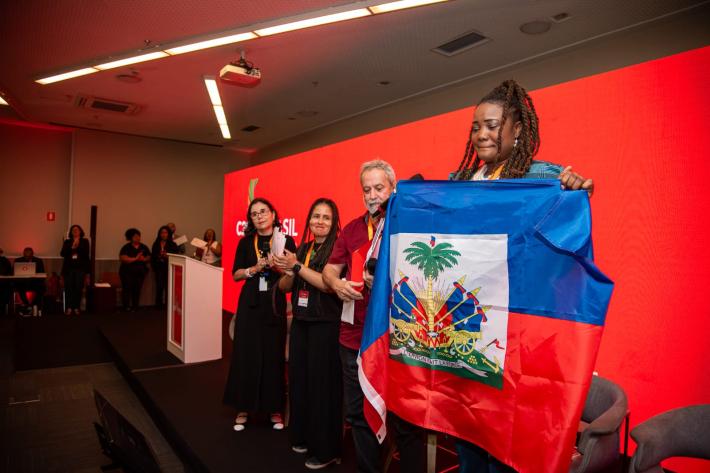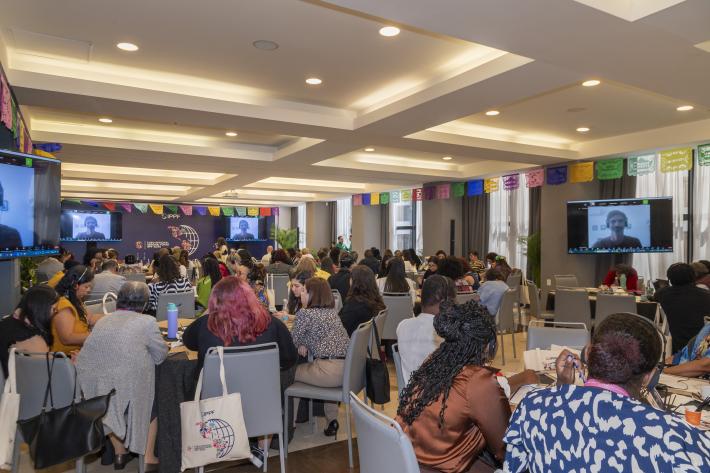Latest press releases
A selection of stories from across the Federation
Americas & the Caribbean
Breaking: IPPF Global Research Exposes Devastating Impact of the Trump Administration
Over Half of Partners and $85 Million Affected
For media enquiries


| 17 May 2024
INPPARES and IPPF's position on Peru's Supreme Decree Nº 009-2024-SA
All LGBTQI+ people in Peru and in the Americas and the Caribbean have the right to lives free from violence! In recent months, IPPF ACRO Member Associations, Collaborating Partners and the IPPF ACRO Secretariat have witnessed how some governments in the Americas and the Caribbean, even some that have historically acted to protect and advance human rights, have become the main opponents of people's rights, freedom and self-determination. So, after writing about our concerns about the new Argentinean government, today, on the International Day Against LGBTIQ+-Phobia, we want to demonstrate our strong concern with the actions of the government of Peru, which undermine the fundamental rights of LGBTIQ+ people. The IPPF Americas and Caribbean Regional Office joins INPPARES, Member Association in Peru, in expressing its rejection of the Supreme Decree Nº 009-2024-SA issued last May 10th by the Peruvian Ministry of Health which, by updating the Essential Health Insurance Plan (PEAS) based on the 10th revision of the International Classification of Diseases (ICD-10), violates the human rights of LGBTIQ+ people. Some context: The PEAS contains the list of interventions that can be addressed by health insurers in Peru, so it is vitally important that it is kept up to date with the guidelines and standards set by the World Health Organisation (WHO). From time to time, the WHO revises its International Classification of Diseases (ICD) to update it based on recent scientific evidence and thus adequately guide global clinical practice. Recall that in 2019, the 11th revision of the ICD made history by removing trans identities and expressions from the chapter on ‘Mental and Behavioural Disorders’. However, last week, the government of Peru decided to use an outdated revision of the ICD, which pathologises sexual orientation and gender identity. This decision of the Peruvian government to use ICD-10 is very serious, as it violates binding codes and agreements at local, regional and international level. On the one hand, it violates the constitutional right to health established in articles 7 and 9 of the Political Constitution of Peru, which establishes the right to health on the basis of equality and non-discrimination. Furthermore, it disregards the information, guidelines and standards of the WHO, the United Nations specialised health agency, and the requests of the Office of the UN High Commissioner since 2015 to stop the pathologisation of LGBTIQ+ people, in particular trans and intersex people. It also goes against commitments adopted by Peru in numerous regional and international declarations, such as the Montevideo Consensus, whose implementation and follow-up was officially adopted in 2016 by Supreme Decree N° 051-2016-PCM. Today, it is necessary to reaffirm that LGBTIQ+ people have the right to live free from violence, to live their gender identity and sexual orientation freely, to access health and reproductive services where their identities are respected and their specific needs are met. It is the responsibility of governments to ensure that these rights are fulfilled.

| 17 March 2022
IPPF ACRO present at the Forum of Latin American and Caribbean Countries on Sustainable Development 2022.
The Fifth Meeting of the Forum of Latin American and Caribbean countries on Sustainable Development 2022 was held in Costa Rica - San José from March 7 to 9, in its face-to-face/virtual form due to COVID-19. This event brought together 1,200 people, including government delegates and representatives of international organizations, the United Nations, the private sector, academia and civil society to discuss the progress and challenges of implementing the 2030 Agenda in the region and how the region has been the most impacted by COVID-19 in terms of development from the health, economic and social point of view. Pamela Martín García, IPPF ACRO's Advocacy and Communications Manager, participated in this indispensable space for regional integration and cooperation. First at the Civil Society meeting and then at the Forum, as well as the March 8th rally in Costa Rica During the event for International Women's Day, civil society representatives expressed their concern about the advance of authoritarian proposals in various governments of the region with public policies that generate setbacks in terms of human rights, sexual and reproductive rights. They also denounced the extreme vulnerability of women environmental defenders in different countries. They called on governments to take affirmative action to address the disproportionate impact of the pandemic on women in the region. One important statistic shared during the event was that 68% of the targets of the Sustainable Development Goals continue on an insufficient trend towards 2030 and that only one third of the 111 targets evaluated are on an adequate pace and trajectory. This urges us to continue working to meet them. The greatest challenge today is to eradicate poverty in all its forms and is an indispensable requirement for sustainable development in the region. During the closing ceremony, delegates from the countries, United Nations agencies, representatives of civil society and other participants paid tribute to Alicia Bárcena, Executive Secretary of ECLAC, who bids farewell to this position with full honors and after a formidable performance, always promoting and defending the human rights of all people. It was she, with her lucidity and eloquence, who for more than 20 years incorporated the feminist perspective in ECLAC and its actions. We join in the heartfelt recognition of a leader who knew how to build in the adversity of inequalities a light of hope throughout the region.
















